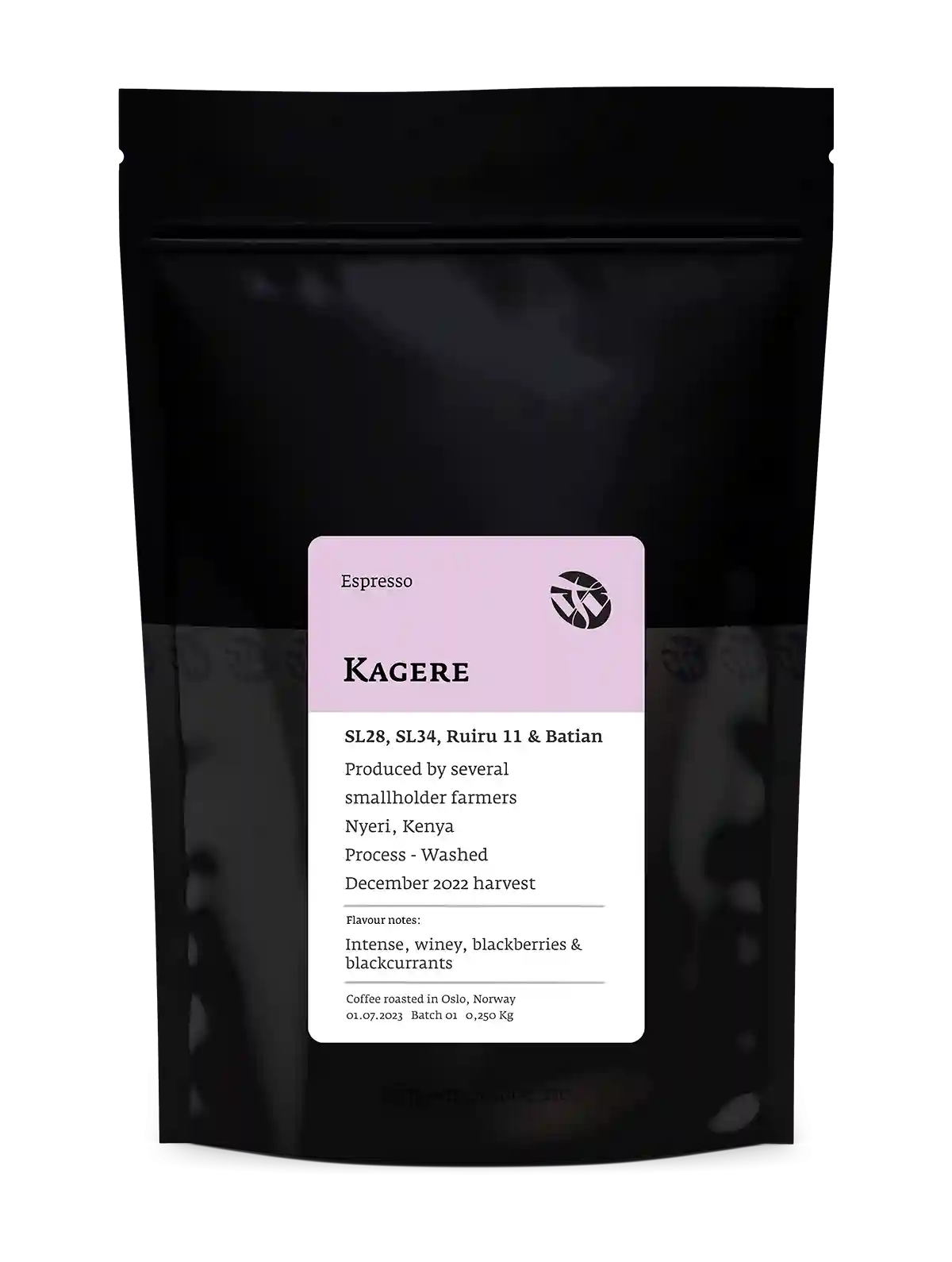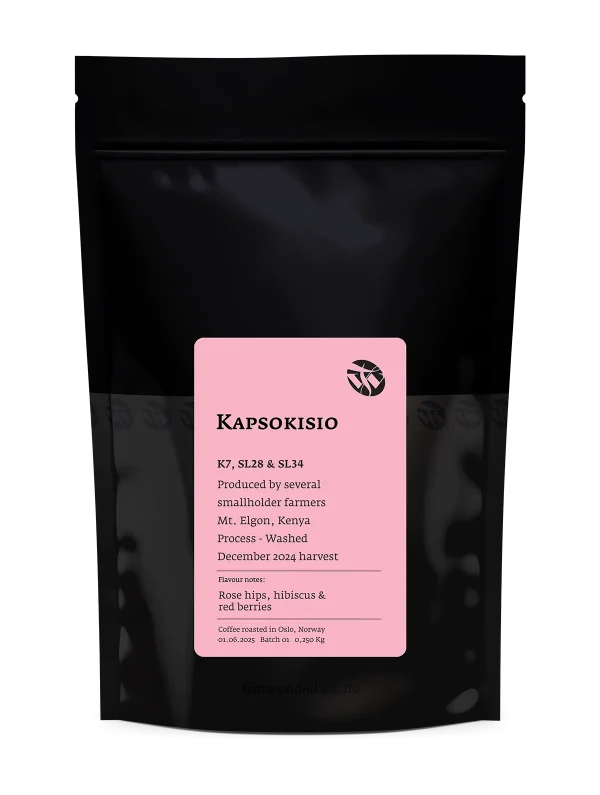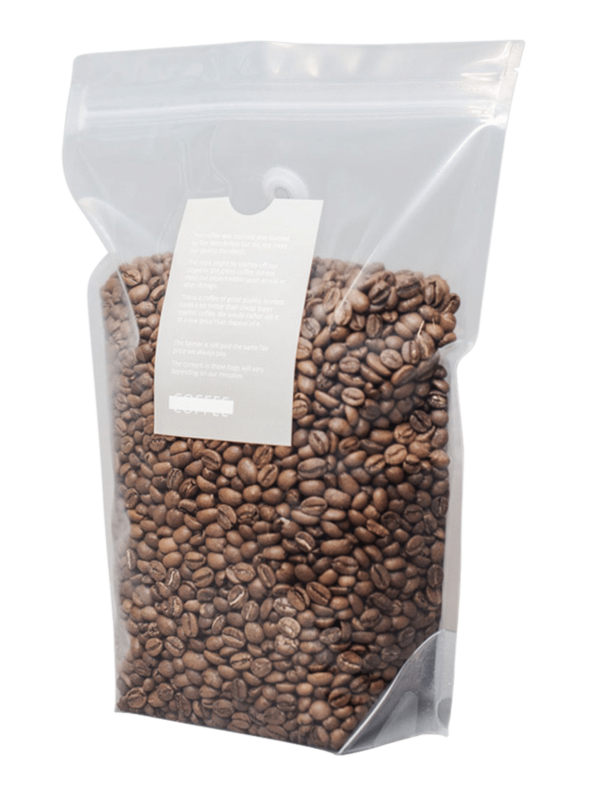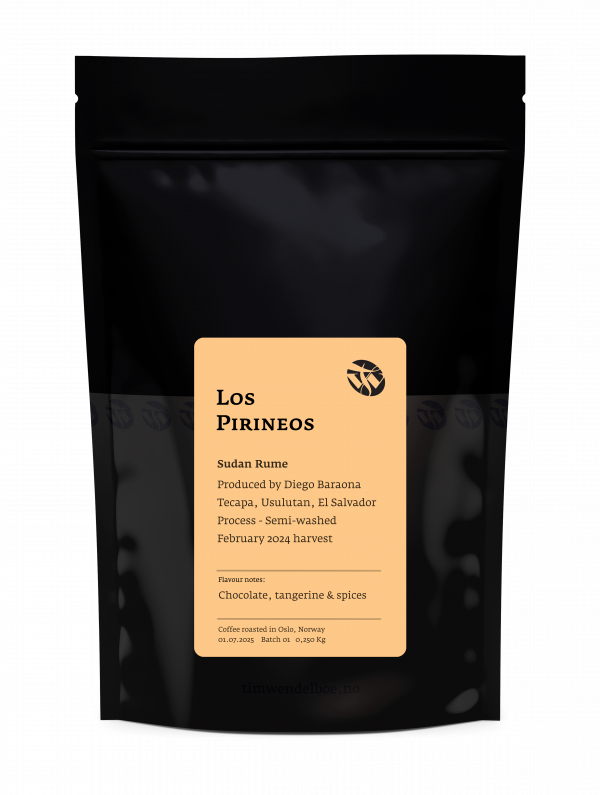| Cultivar | SL28, SL34, Ruiru 11 & Batian |
|---|---|
| Flavour Notes | Intense, winey, blackberries & blackcurrants |
| Producer | Several smallholders farmers |
| Country | Kenya |
| Region | Nyeri |
| Process | Washed |
| Harvest | December 2022 |
| Roast Profile | Espresso Roast |
| Bag Size | 250g |
| Contents | Whole Coffee Beans |
Kagere Espresso
kr195.00
This Kenyan coffee from the Kagere wet mill has intense fruity and winey flavours of blackcurrants and blackberries with a refreshing and winey acidity.
Out of stock
Additional information
Tim's Notes
Kagere produced one of my favourite Kenyan coffees in the 2021/22 season and I was so revealed that they also produced a phenomenal coffee during the 2022/23 harvest. It was like last year one of the stand out coffees during my selection process while I was in Kenya in February and in my opinion the overall quality in the 2022/23 harvest was far better than the year before.
If you love Kenyan coffees as much as I do, then this one is a real treat. It has a super refreshing and winey acidity that is balanced with intense "purple flavours" like blackcurrants, blackberries, red grapes and sour cherries.
I have not personally visited the Kagere wet mill, but in the past we have bought several lots of coffee from the Othaya Farmers Cooperative Society which Kagere is a part of.
If you love Kenyan coffees as much as I do, then this one is a real treat. It has a super refreshing and winey acidity that is balanced with intense "purple flavours" like blackcurrants, blackberries, red grapes and sour cherries.
I have not personally visited the Kagere wet mill, but in the past we have bought several lots of coffee from the Othaya Farmers Cooperative Society which Kagere is a part of.
Cultivar
About The Cultivars
This coffee is produced by several hundred farmers, most of them growing the famous Kenyan SL28 and SL34 cultivars. While some have planted newer hybrids like Ruiru 11 and Batian you can clearly taste the clean and fruity flavours in this coffee that are so common for the SL cultivars.Process
Kagere Production Process
Picking and sorting
The coffee cherries are typically hand picked by the farmers and their family members. After delivering the coffee cherries to the wet mill the good coffee cherries are separated from the inferior ones by hand sorting and they are delivered in separate cherry hoppers.Depupling, fermenting & washing
The cherries are depulped and graded by using an old Aagard disc de-pulper that uses water and gravity to sort dense beans from less dense beans. Coffee of different grades are moved to separate fermentation tanks where the parchment coffee, with it’s mucilage still on, is dry fermented for about 12-16 hours over night. After fermentation the coffee is washed in clean water and graded once again by gravity. The more dense beans are dried separately from the beans with lower density and inferior quality.
Drying
The coffees are dried on elevated drying tables, where defect parchment coffee gets sorted out by hand. Drying the coffee takes about 10 – 14 days. During daytime the coffees are raked to ensure even drying. The drying tables are covered during the hottest times of the day to avoid over heating and also at night time to prevent condensation. The drying process is finished when the moisture content in the coffee beans is between 10-12%. After drying, the coffees are stored in conditioning bins before delivery to the dry mill. The coffees we buy from Kenya are always vacuum packed before it is shipped to Norway.
Shipping
For our Norwegian customers, we offer three shipping options:
- Pakke i Postkassen - With Pakke i Postkassen, tracking is provided, and delivery is estimated within 2-3 business days.
- Pakke til hentested - The parcel can be collected from a Post in Store, Post Office, parcel locker, or parcel box. This option includes tracking, with delivery expected within 1-5 business days.
- Norwegian Post, No Tracking (Brevpost) - This option does not offer tracking. Delivery is estimated within 2-5 business days.
How To Brew
Filter
We strongly recommend using the correct measurements and brewing techniques when you brew our coffees. Use a digital scale both to measure water and coffee in order to get consistent results, and we recommend using between 60 to 70 grams of coffee per litre (1000g) of water, depending on the brewing method, water quality and coffee used.
Espresso
We strongly recommend using VST filter baskets. Both the 18g, 20g and the 22g basket is great for our coffee. The VST filters makes it a lot easier to extract the espresso properly which gives a lot more sweetness in the cup. They are also more or less identical to each other which makes it easy to be more consistent when brewing on several groups at the same time. You can buy the filters on our webshop, just make sure they fit your machine (ours fits all La Marzocco machines and machines with 58mm filter baskets). With the VST 18g filter basket, we recommend the following brewing parameters: 18-19g freshly-ground coffee, 25-35s brewing time, 35-38g of final brew liquid in the cup, 93°C-94°C brew water temperature.
We strongly recommend using the correct measurements and brewing techniques when you brew our coffees. Use a digital scale both to measure water and coffee in order to get consistent results, and we recommend using between 60 to 70 grams of coffee per litre (1000g) of water, depending on the brewing method, water quality and coffee used.
Espresso
We strongly recommend using VST filter baskets. Both the 18g, 20g and the 22g basket is great for our coffee. The VST filters makes it a lot easier to extract the espresso properly which gives a lot more sweetness in the cup. They are also more or less identical to each other which makes it easy to be more consistent when brewing on several groups at the same time. You can buy the filters on our webshop, just make sure they fit your machine (ours fits all La Marzocco machines and machines with 58mm filter baskets). With the VST 18g filter basket, we recommend the following brewing parameters: 18-19g freshly-ground coffee, 25-35s brewing time, 35-38g of final brew liquid in the cup, 93°C-94°C brew water temperature.




